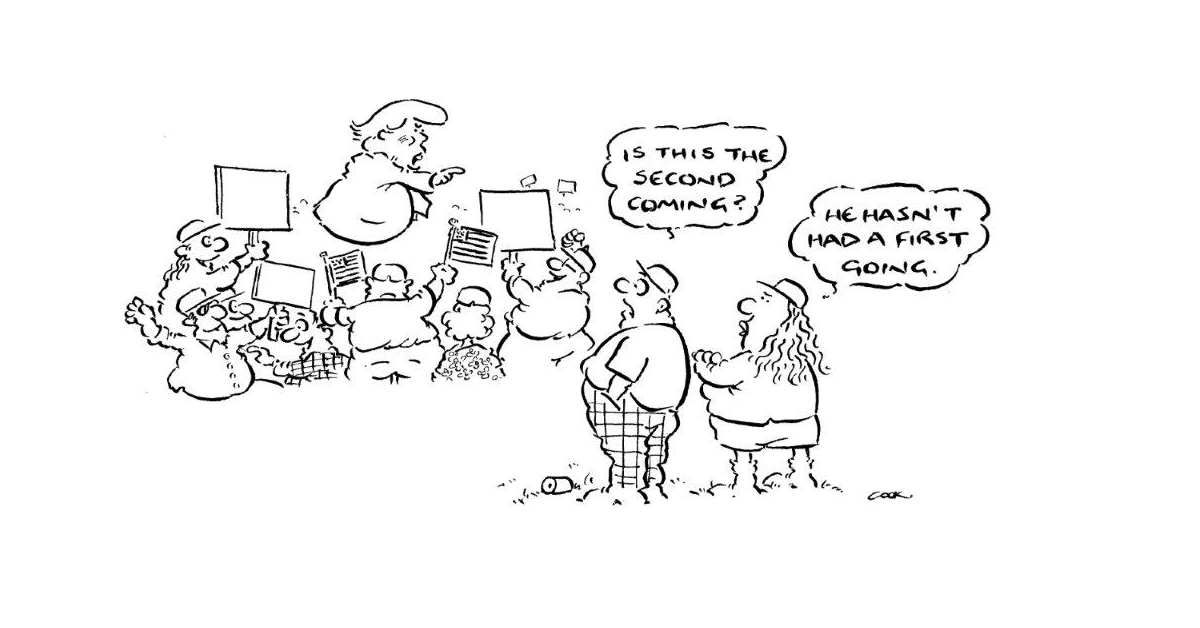Whilst enjoying your Perrier-Jouët Belle Époque…
If you are under 45 you don’t know...
… and if you are over 45 you cannot remember… what high inflation is like.
Not that a CPI of 6.1% is reason to go and kick the cat. Err, well, maybe it is.
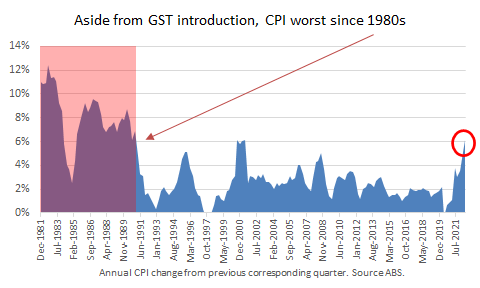
The 1980s were the heady days of inflation greater than 6% for years, 10%+ mortgage rates, the Cold War, oil prices trebling overnight, wars in the Middle East, plane hijackings aplenty.
Now Wry & Dry cannot help but look at 2022:
- return of inflation
- higher mortgage rates
- a war in Europe with a nuclear power on one side
- an Asian nuclear power flexing its muscles
- the tail-end of that capricious bug called covid
- the rise of breathtaking governmental incompetence in the English-speaking world
No, it’s not Armageddon. Wry & Dry is not going to put flowers in his hair and live on a commune. And neither should Readers. Notwithstanding yesterday’s words from treasurer Grim Chalmers.
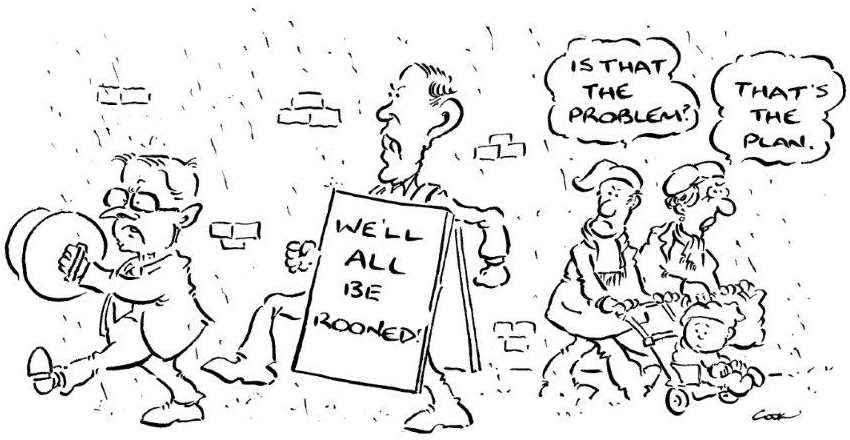
However, there is merit in thinking if there are some sensible fiscal things to do, then do them.
In the 1980s, the ASX returned an average of 17.7% p.a. Useful. But with significant volatility.
Take care, out there.
Meanwhile, the US economy goes pear shaped. Sort of.
It’s not obvious with an unemployment rate of just 3.6%. But the US is now in a technical recession.
Err, what’s a ‘technical recession’? Well, the boffins say that it’s two successive quarters of negative GDP growth. In the March quarter, US GDP was -1.6%. In the June quarter, it was -0.2%.
Time to person the life-rafts? Again – no. On almost any other measure, the US economy is of reasonably sound mind.
Unlike its political leaders.
Just when you thought it were safe…
…the Trumpster returns.
It’s been 18 months since the Trumpster departed Washington. Then with the stigma of the 6 January riots. Well, he didn’t think there was a stigma. And still doesn’t.
So he returned this week to a hero’s welcome from an audience that sees him as only a little less than a saviour that came down from the cross. Which contrasts to his own view of that he is actually The Saviour.
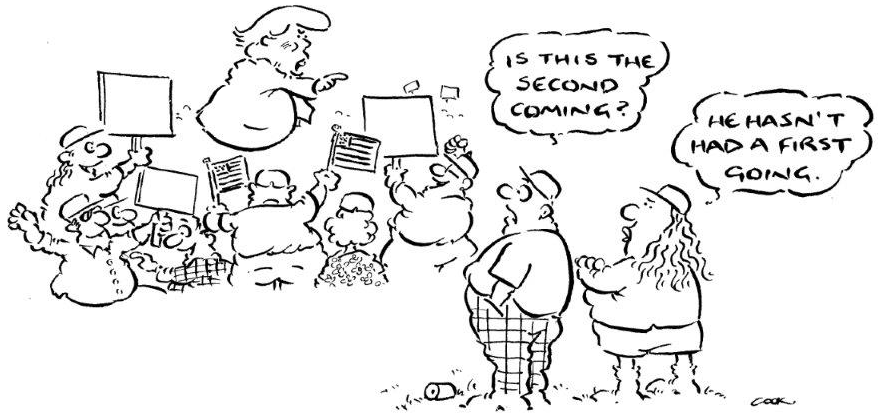
Which was sort of weird. No sign of humility. No hint of forgiveness. And a passing reference that drug dealers should be given the death penalty.
Once he got under way, there was no slowing down the gush of policies (some good, it must be said). The Trumpster drew energy from the crowd. And they gave it back. For 90 minutes in a blend of a Rolling Stones concert and a Nuremberg rally.
What now? He continues to tease like a mouse with a kitten about whether he will stand again. But whilst his virtues are all apparent, so much more are his flaws.
Italy returns to type
It was all going so well.
Eighteen months ago, Italy’s President called on Mario Draghi, the former governor of the European Central Bank1, to become Prime Minister and rescue the hapless covid-stricken Italian government from chaos. Draghi formed a coalition government (there is no other way to form a government in Italy). And all has been well.
But now some of his coalition partners have turned their coats. And so it has collapsed. Wry & Dry will not, for now, trespass on news this morning that one of the far right parties in the coalition (League) was influenced by the Kremlin to leave the coalition.
Elections have been called for September. The polls are predicting a victory for another far right party: Brothers of Italy, ironically headed by a woman: Giorgia Meloni.
Signorina Meloni has a past of being an acolyte of a certain Benito Mussolini2.
Leave aside the problem of a possible government that might provide succour for Tsar Vlad. It is entirely possible that the splendid ability of Italian government to get paid by others to undertake long overdue economic and structural reform and not undertake any reform will be maintained.
Draghi negotiated €200 billion of EU funds to reboot the chronically underperforming Italian economy. The dosh was conditional upon an ambitious timetable of reform milestones and investment targets.
There are two chances of any reform happening. But Italy will probably get the dosh anyway.
1 Draghi’s role in the Eurozone crisis of 2011 (aka ‘almost Grexit’) was masterful, becoming famous throughout Europe for saying that he would do “whatever it takes” to prevent the euro from failing. Those words eased the panic and there was no need to “do whatever it took”.
2 Mussolini was a dictator of Italy and principal founder of fascism. He was deposed in 1943, was arrested, but was rescued by German paratroopers who then took him to safety in northern Italy. But in April 1945 he was captured by Italian partisans, shot and his body hung upside down from the roof of an Esso petrol station. His singular success was making the trains run on time.
Blaming rights
Good grief. Australia’s heartbeat of democracy, the federal parliament, reopened this week. Day 1 resembled a 5 year-old child’s birthday. Smoke, mirrors, party hats, photos, etc. The only thing missing were the buckets from KFC.
And the headlines were about one half of the House wearing face masks, the other not. Surely the media could do better.
Day 2 was the expected blame of the previous government for everything that is wrong with the world. Which was only about 25% true, but, well this is politics. Readers will well remember Tony Abbott, when succeeding The Ruddster & Dame Julia, continuing his brilliant evisceration of all things Labor.
To the victor goes the spoils. And blaming rights.
But for only so long. Albo should take care. The Abbott probably spent too much time eviscerating and not enough time leading. And Croesus Turnbull was only too happy to fill the perceived evisceration gap that William Shorten couldn’t.
Which is probably how the world got Scott Morrison, who could neither eviscerate any opposition nor lead.
Taking responsibility
Many events occurred in Wry & Dry’s absence last week. Most notable was Chairman Dan’s response to the Independent Broad-based Anti-corruption Commission’s report on corruption on his party – the governing party in Victoria since 2014.
Chairman Dan’s response was to “take full responsibility” for Labor’s “shameful”, “deplorable”, “disgusting” and “absolutely disgraceful behavior”. And then do nothing.
Readers will recall previous mea culpas:
“I’m accountable for any and all mistakes that are made…” (early days of the pandemic).
“I am responsible for everything…” (hotel quarantine fiasco).
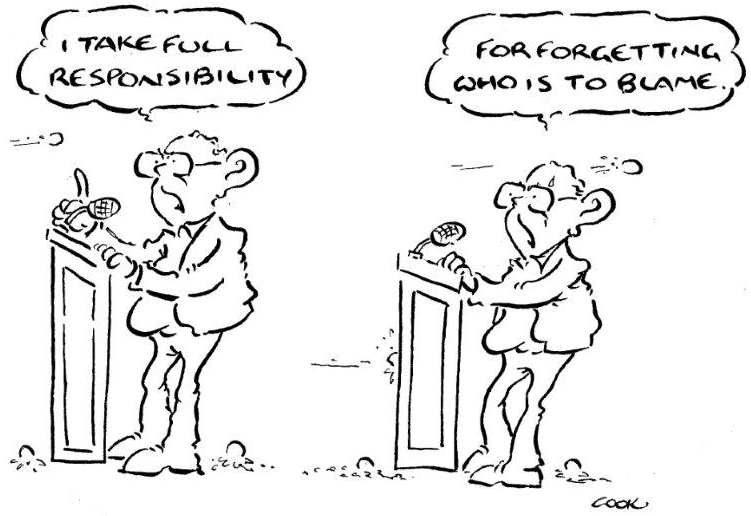
Hold the phone. Any right-minded person would conclude that if an honourable person took full responsibility for an offence, then he or she would do the right thing. And take the consequences.
In Roman days, the right thing to do would be to fall on one’s sword. Or a cabal of might-be mates would form a circle and plunge knives into the honourable person.3
3 The last political leader to do the honourable thing was probably PM John Gorton, who in 1971 used his casting vote in a no confidence motion to vote against himself, thereby giving himself the DCM. Sadly, he was succeeded by Billy McMahon, who then held the mantle of Australia’s worst Prime Minister until Scott Morrison came along.
Bank with the Wails
The trend of CEOs to become commentators on all things reached a new low this week.
The CEO of Westpac Bank, Peter King, speaking after a market update on his bank’s performance, said that “Australia can’t afford to muck around on a phased transition to more renewable sources of energy.”
Noble sentiments indeed. But, really, does anyone give a fig about his views on renewable energy? Or indeed anything other than matters within his sandpit?
International negotiating Germany v Poland
It seemed a great idea.
Ukraine wanted tanks to fight Tsar Vlad. Germany didn’t want to supply tanks to Ukraine as it might antagonise Tsar Vlad.
So, Poland would give tanks to Ukraine and Germany would give Poland tanks to backfill the gap.
Simple.
Poland gave Ukraine 240 tanks. Germany gave Poland… 20 tanks. And the 20 are in such bad shape it will take a year to repair them.
What’s going on?
It was so boring
Wannabe UK prime ministers Liz Truss and Rishi Sunak were having a verbal stoush on national television. And then came the noise of a thud that sounded like someone collapsing.
Which is what happened. The moderator of the debate, Kate McCann went down like a sack of spuds, to the shock of the politicians. And probably herself.
It seems as though she fainted, likely from sheer ennui.
The candidates did what any British politician would do. Say nice words, pause to put the kettle on. And then resume the debate.
Rights
It is a truth universally acknowledged that giving a ‘right’ to a small group of people invariably takes away ‘rights’ of others. It tends to be the smaller and noisier that get their ‘rights’ upheld.
But help is at hand, from an unlikely source. Former wannabe prime minister and now federal government services minister Bill Shorten has shown a measure of commonsense in Canberra not seen since Australia moved to decimal currency.
He has scrapped a Medicare consent form for new parents that used the term ‘birthing parent’ instead of ‘mother’.
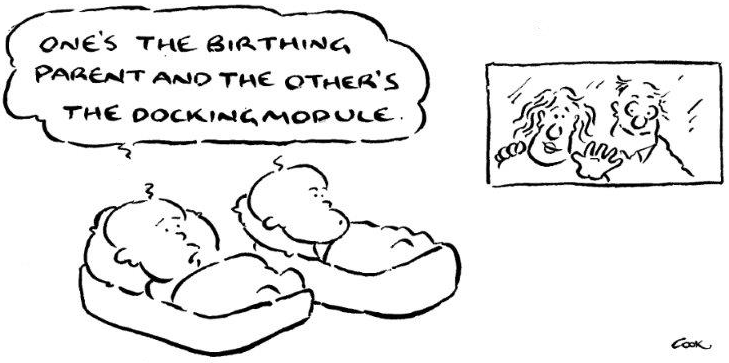
Yes, the right of a mother to be called a mother is perhaps one of the more precious rights.
A grumpy parent might well ask what rocket surgeon living in the bowels of anonymity in Canberra decided to call mothers not mothers but birthing parents in the first place?
Unclear on the concept
Princess Harry addressed the United Nations to help celebrate Nelson Mandela’s legacy. He spoke of the need to lower fossil fuel emissions and for greater equality.
And flew to his $18m home in California in a private jet .
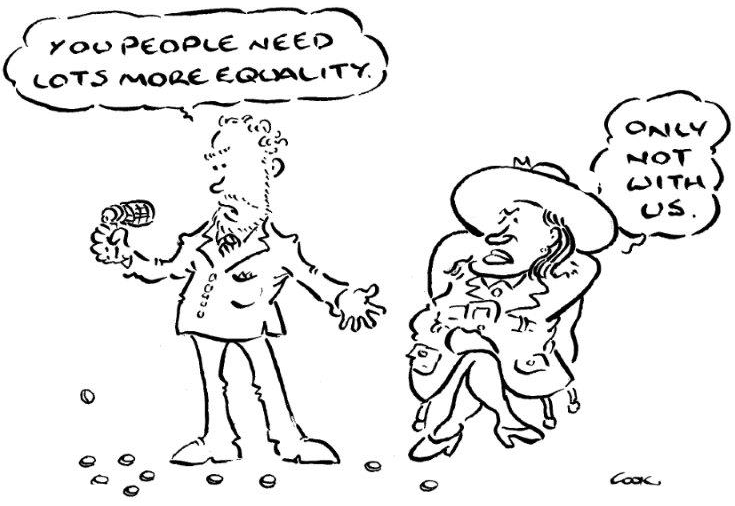
Levies: Bhutan takes podium position
That cute Himalayan kingdom of Bhutan will soon introduce the world’s highest tourist levy. A mere $200 per person per day.
The cadence of the levy reminds Wry & Dry of the Australian army’s beer ration levy: one can, per man, per day, perhaps.
Boycotts
A wave of disgruntled homebuyers in Emperor Xi’s empire are refusing to pay mortgages for unfinished or stalled housing projects. Homebuyers in 22 cities have shut their wallets.
The problem is that buyers pay 30% up front and borrow the balance. So the developer gets 100% of the purchase price before a sod is turned. The buyer has to finance the loan and wait for the project to finish – and hope for early completion so that the property can be sold for a higher price.
For a host of reasons, property developers only delivered around 60% of homes they presold between 2013 and 2020.
Ouch.
This will end in tears. In fact, the tears have already started to flow. Some high-profile developers have already fallen into default, most notably Evergrande, the country’s second-biggest property firm, which said last year that it could not pay part of its $300 billion debt.
Emperor Xi’s economic miracle had some key features: ever-rising home prices, surging household debt, and a real estate sector that broadly contributes to one third of GDP.
But now gravity has taken over.
Stop press: The People’s Bank of China is going to borrow up to about $150 billion to lend to commercial banks, which in turn would leverage those funds about five times to lend to property developers to finish projects. Good money after bad, perhaps?
Habits: faster police car
Those Czech police are a canny lot. A car was confiscated from criminals. Rather than sell it or trash it, they decided to spend €12,000 to convert it into a police car. It would make a great addition to their fleet of Skodas.
But it might stand out. The car is a Ferrari 458 Italia, capable of pulling over perps travelling at up to 320 kph.

There is a waiting list of Czech policepeople wishing to undertake traffic duty.
Snippets from all over
1. Germany the weakest link
Growth in Europe’s largest economy will be the weakest among the Group of Seven nations this year, according to fresh forecasts by the International Monetary Fund. (Bloomberg)
Wry & Dry comments: The IMF didn’t give a separate forecast for Australia. The wooden spoon for growth goes to Tsar Vlad. Russia’s GDP growth is forecast to be -6% in 2022 and -3.5% in 2023. Nice work, Vlad; all by yourself.
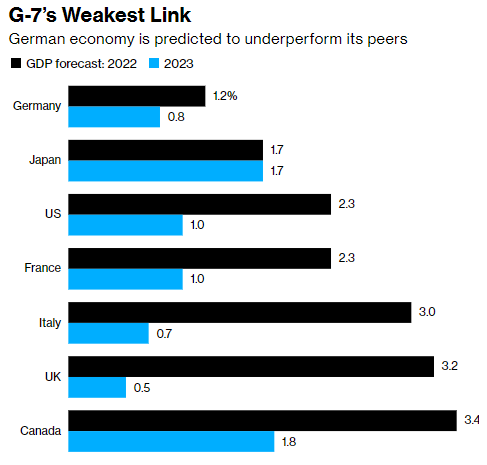
2. European foot off the gas pedal
European Union countries have approved a plan to reduce gas consumption by 15% as they brace for further Russian reductions in supply. (The Times)
Wry & Dry comments: On Wednesday Gazprom cut the flow of gas through the Nord 1 pipeline by 80%, for… turbine maintenance reasons.
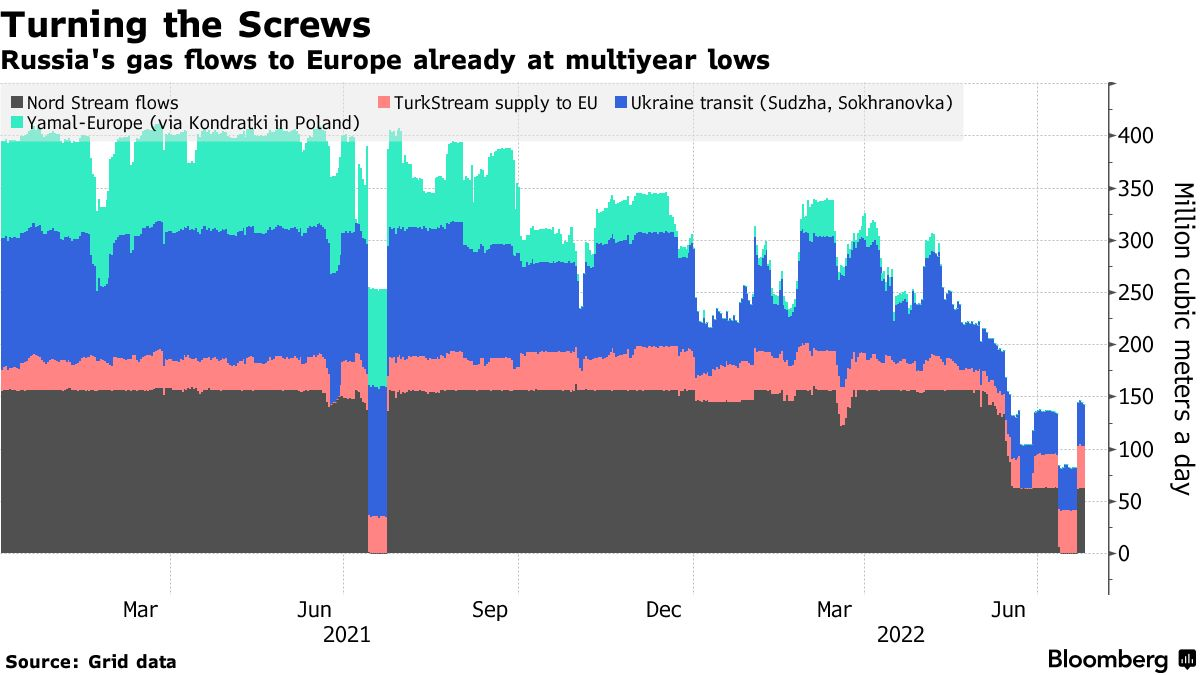
3. Gen Z stays at home
Nearly a third of Americans between the ages of 18 and 25 — part of what is collectively known as Gen Z — live at home with their parents or other relatives (New York Times)
Wry & Dry comments: It’s probably higher in Australia.
4. Strong dollar wipes billions
The strong US dollar has wiped billions of dollars off the second-quarter sales of US companies, prompting many to cut their [profit] guidance for the remainder of the year. (The Financial Times)
Wry & Dry comments: The dollar is at a 20-year high.
5. Hold out US Senator changes mind
Senator Joe Manchin of West Virginia, a key centrist Democrat, announced that he had agreed to include hundreds of billions of dollars for climate and energy programs and tax increases in a package to subsidize health care and lower the cost of prescription drugs, less than two weeks after abruptly upending hopes for such an agreement this summer. (New York Times)
Wry & Dry comments: This is a life-line for Sleepy Joe, but too late? The package is massive and unprecedented: $369 billion for climate and energy proposals and an estimated $451 billion in new tax revenue over a decade, while cutting federal spending on prescription drugs by $288 billion.
Data
- Australian inflation grew to 6.1% in the year to June.
- US GDP shrank by 0.2% points in the June quarter, putting the US in a technical recession.
- The US central bank raised interest rates by 0.75% points.
- The IMF downgraded its global GDP growth forecasts to 3.2% this year (from 3.6%) and 2.9% (from 3.6%) in 2023.
And, to soothe your troubled mind…
“This is of course bad.”
- Sergey Lazarev, president of the Moscow Chess Federation, commenting on a robot breaking a seven-year-old boy’s finger during a chess match last week.
Does he have a view on Tsar Vlad’s invasion of Ukraine?
PS The comments in Wry & Dry do not necessarily reflect those of First Samuel, its Directors or Associates.
Cheers!
Anthony Starkins

